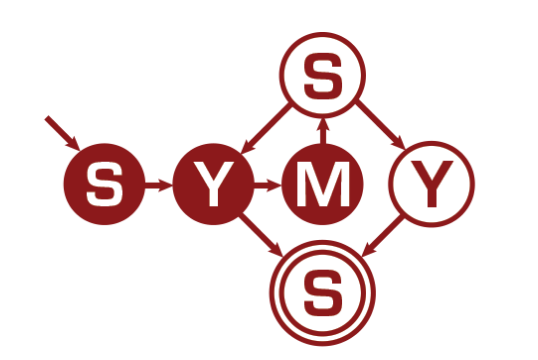"The systems we study, whether they are languages, computers, or minds, are all different layers of the way we understand the world, and I like reflecting on which part of the biological or technical stack I’m learning about..."
Devangi is a Symbolic Systems coterm who got her undergraduate degree in Physics.
Introduce yourself: Hi! My name is Devangi and I’m a SymSys coterm. I recently finished my undergrad degree in Physics with a notation in Science Communication. I’m currently researching the theory behind persuasive design techniques under my advisor, James Landay. I’m also working with Paul Fuoss at SLAC to understand the user experience of scientists conducting experiments using the LCLS x-ray laser. I like solving problems using technology, studying how interfaces affect cognition, and attempting to understand the universe from first principles.
What drew you to the SymSys major? Why did you pick SymSys as opposed to other (especially, related) majors?
I’ve always been a very interdisciplinary person, and as an undergrad, I naturally gravitated towards classes in over fifteen departments on campus. SymSys was the major that best fit the classes that I would have taken anyway, which is how I knew it would be a good fit!
What is your concentration and why did you choose it?
Although I don’t have an official concentration, most of my SymSys classes have been related to human-computer interaction. I chose to study this field because I wanted to understand how minds and machines complement and affect each other, and how they can work together synergistically to create positive change at both an individual and societal level.
What’s your favorite SymSys-related class that you’ve taken so far?
My favorite SymSys-related class so far has been SymSys 115: Critique of Technology! It was an amazing seminar taught by Damon Horowitz, who is both a philosopher and a technologist. We read essays ranging from Aristotle to Heidegger in order to understand the various definitions of technology, the line between the natural world and the humanmade, and the ways our minds “enframe” technology. It was a great way to step back and look at some of the larger questions about the way technology is embedded into our lives.
Are you involved in research? If so, tell us about a project you are working on:
Yes! I’m interested in how social media websites often manipulate and persuade us to do things they want (click this! watch this!) by benefitting from some of our cognitive and social biases. In my HCI research class, we wanted to see whether whether revealing to people in real time the little ways they were being manipulated by Facebook could do a better job teaching them about persuasive design techniques than traditional teaching methods. We built a Google Chrome extension that annotated people’s Facebook feeds to point out these manipulations, and found that people using the extension had significantly better transfer knowledge about persuasive design techniques.
What is one piece of advice you'd like to offer to younger students?
Let yourself take whatever courses really pique your interest even if you can’t see how they all relate right now. Looking back, you will definitely see a way they connect and your diverse background will actually be an asset for whatever you choose to work on next!
What underlying questions and issues do you hope to tackle/learn more about through SymSys?
One of my underlying interests since high school has been the study of consciousness. I want to learn more about phenomenology and interdisciplinary approaches to tackling things like the hard problem of consciousness: why is the “what-it’s-like”-ness of experience the way it is?
As a diverse major with a lot of flexibility, many students struggle to find continuity across their coursework. (How) do you address this?
I’ve tried to embrace the eclectic nature of our coursework and trust that meaning will eventually emerge. The systems we study, whether they are languages, computers, or minds, are all different layers of the way we understand the world, and I like reflecting on which part of the biological or technical stack I’m learning about.
What’s the coolest (loosely) SymSys-related topic that you’re excited about right now?
I’m really excited about the ethics of technology design. There is an important movement gaining traction in Silicon Valley right now regarding the ethical responsibility that large, monopolistic mass consumer websites have towards their users. The attention economy incentivizes such companies to capture the most eyeballs for the longest time, which leads them to use techniques that “race to the bottom of the brainstem,” as people like Tristan Harris have put it. How might we encourage the designers of these technologies to be more mindful of their user’s attention, intentions, and cognitive resources?
Devangi is one of many profiles featuring selected alumni, undergraduates and graduates who are involved in the Symbolic Systems community.




